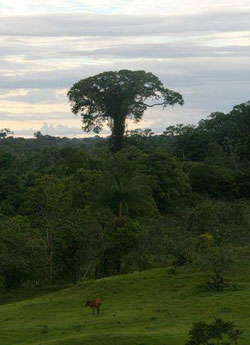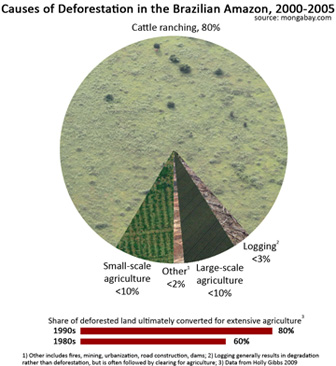Can new loan really bring sustainable cattle ranching to the Amazon?
Can new loan really bring sustainable cattle ranching to the Amazon?
mongabay.com
March 12, 2007
Brazil’s second largest exporter of beef has won approval of a controversial loan from the International Finance Corporation (IFC), the private equity lender of the World Bank, according to a report from the Associated Press. Environmentalists say the deal will drive further deforestation in the biologically rich Amazon rainforest. Cattle ranching is responsible for more than half of forest loss in the region.
The $90 million loan will allow the Bertin Group, which generates more than 30,000 jobs in Brazil, to “expand and modernize” its operations throughout the country.
In granting the loan, the IFC acknowledged environmental concerns but said the project is “an opportunity to partner and engage a leading private sector company in tackling the most serious environmental and social issues facing the Brazilian Amazon.”
In a statement, IFC claimed the loan will help Bertin “develop a system, the first of its kind in Brazil, to ensure that Bertin’s cattle is source from ranchers that use sustainable practices and do not contribute to increased deforestation of the Amazon. The project will adhere to IFC’s environmental and social performance standards.”

Photo of cattle pasture in the Amazon rainforest of Colombia by Rhett A. Butler, mongabay.com. |
IFC maintained that the project will reduce the environmental impact of cattle ranching by requiring Bertin’s cattle suppliers in the Amazon region to “abide by a rigorous list of environmental and social requirements.”
“There is a real need to reconcile the economic development of the Amazon with its environmental conservation,” said Atul Mehta, IFC’s Director for Latin America and Caribbean Region. “The cattle raising industry is an important component of the economic activity in the Amazon. By engaging with Bertin, IFC is seeking to develop new standards for dealing with some of the environmental and social challenges in this sector.”
“No other investment bank is as strict as IFC on economic, environmental, and social assessments,” added Douglas de Oliveira, Grupo Bertin’s Chief Financial Officer. “Grupo Bertin wants to become a standard setter in sustainable development. We are making a long term commitment, in which we hope to engage not just IFC but all stakeholders. We are confident that we are helping bring about a new paradigm for the Brazilian cattle industry.”
Criticism

Chart created by Rhett A. Butler, mongabay.com. |
Nevertheless, some environmental groups aren’t pleased with the deal, noting that the IFC has a checkered environmental record with its past sponsorship of infrastructure projects in ecologically sensitive areas. Further, argued a coalition of green groups led by Friends of the Earth – Brazil, the expansion of ranching in Amazonia will generate increased emissions of greenhouse gases and could trigger further illegal forest clearing.
Environmental groups have grounds to be suspicious: to date the bulk of Amazon forest loss has been for cattle pasture. Dr. Philip Fearnside, a scientist with the National Institute for Research in the Amazon in Brazil and a renowned expert on deforestation, estimates that more than 60 percent of Amazon forest loss since the 1980s has resulted from land-clearing for cattle pasture. This land conversion has helped Brazil become the world’s largest exporter of beef but also driven record levels of deforestation, peaking at 20,059 square kilometers (11,220) in 1995.
Due to the economic and environmental significance of beef in the Amazon, some environmental groups are working to make beef production more sustainable. Alianca da Terra, an NGO founded by Texan John Cain Carter, hopes that eco-certified beef could be the key to reducing the impact of cattle on the Amazon ecosystem.














